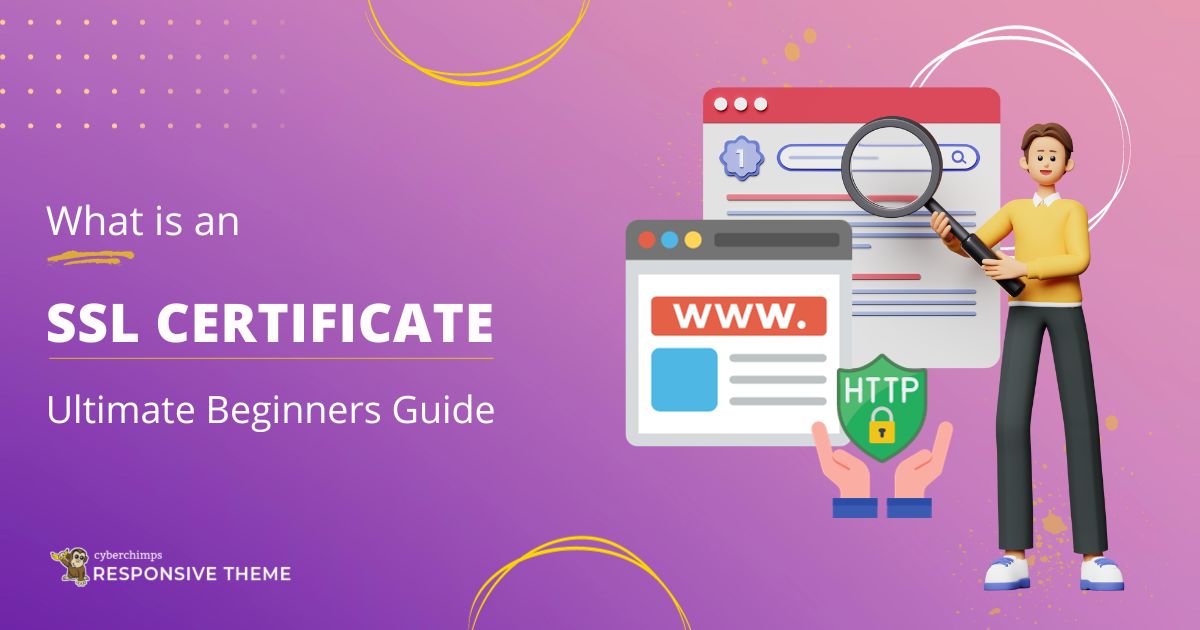Worried about your website’s security and protection? Let’s learn about SSL certificate and how it protects your website!
Whether you’re shopping online, logging into your bank account, or simply browsing the web, you want the assurance that your data is safe.
Every website handles sensitive information that needs protection from hackers and malicious parties. This is where SSL certificates come into play.
In this article, we will explore the different types of security certificates and how you can obtain a free SSL certificate for your website.
Let’s dive in!
What is an SSL Certificate?
Secure Sockets Layer (SSL) is an encryption-based internet security protocol. It’s a digital certificate that guarantees the authenticity of your website and helps secure data transmission between the web browser and the website’s server.
These certificates ensure your visitors that your website is secure and trustable. A website that implements an SSL certificate has “HTTPS” in its URL instead of “HTTP.”
Here’s an example of a secure website URL:
https://cyberchimps.com/
An SSL certificate contains the following information:
- The certificate holder’s name.
- Certificate-issuing authority name, digital signature, and public key.
- Serial number and expiry date.
These components collectively form the SSL certificate. The SSL handshake process helps to establish a secure and encrypted connection to keep your website completely secured.
Why SSL Certificates are Important?
Apart from establishing a secure connection for your websites, SSL Certificates cover a wide range of functionalities like:
- Privacy: The information transmitted between a user and a website is kept private using SSL and cannot be accessed by unauthorized parties.
- Data Integrity: SSL ensures that data remains unaltered during transmission.
- Trust: The certificate provides authentication, assuring users that they connect to a legitimate website and not to a fraudulent one.
- Search Engine Rankings: Google prioritizes websites with security certificates, potentially boosting your site’s visibility in search results.
SSL certificate is a mark of trust, ensuring total website security.
How Does SSL Certificates Work?
SSL certificates primarily perform the following functions:
- Encryption: Uses encryption algorithms to scramble data during transmission. This makes it unreadable to anyone trying to intercept it.
- Authentication: SSL certificates confirm the identity of the website’s owner by verifying it with a trusted Certificate Authority (CA). Essentially this helps users trust that they are visiting the correct website.
The Certificate Authority (CA) is responsible for issuing SSL certificates.
What is a TLS Certificate?
TLS (Transport Layer Security) is the successor to SSL and provides similar security features. SSL was the original protocol developed for online security, but due to vulnerabilities and security flaws, it evolved into TLS.
TLS certificates are used to secure network connections. Despite the differences in name, TLS and SSL are the same security protocol versions. However, TLS is the more modern and secure version.
Different Types of SSL Certificates
SSL certificates come in various types to meet the specific needs of different websites and businesses. Here are some of the various SSL certificates:
- Domain Validated (DV): Only verifies the domain ownership. It is easy and quick to obtain.
- Wildcard Certificates: Secures domain and all its subdomains. Ideal for large websites with numerous subdomains.
- Organization Validated (OV): Assures visitors about domain ownership and that your business is a legitimate legal entity.
- Extended Validation (EV): This premium-level certificate involves a detailed verification process. They display the organization’s name in the browser’s address bar and offer visitors the highest level of trust in your site.
- Multi-Domain (SAN) Certificates: A single certificate secures multiple domains. Therefore, it saves time and resources.
In the next section, we’ll explore how to get an SSL certificate to ensure a completely secure website.
How To Get A Free SSL Certificate For My Website?
Here are two standard methods to get a free SSL certificate for your website:
Method 1: Using Let’s Encrypt
Let’s Encrypt is a free, automated, open-s Certificate Authority (CA) provided by the Internet Security Research Group (ISRG). It utilizes the Automated Certificate Management Environment (ACME) to deploy free SSL certificates automatically.
Check for updates in your server’s software packages by using the following code:
CentOS: sudo yum update && sudo yum upgrade Debian/Ubuntu: sudo apt update && sudo apt upgrade
How to Download and Install Let’s Encrypt?
Step 1: Install the following git package:
CentOS: sudo yum install git Debian/Ubuntu: sudo apt-get install git
Step 2: Download a clone of Let’s Encrypt from the Official GitHub Repository.
/opt is a common installation directory for third-party packages, Now let’s install the clone to the following address path /opt/letsencrypt:
sudo git clone https://github.com/letsencrypt/letsencrypt /opt/letsencrypt
Step 3: Navigate to the new /opt/letsencrypt directory:
cd /opt/letsencrypt
Now that we have installed Lets Encrypt, let’s move on to creating an SSL certificate
Creating an SSL Certificate using Let’s Encrypt
Let’s Encrypt automatically performs Domain Validation (DV) using a series of protocols. The Certificate Authority (CA) uses protocols to verify the authenticity of your computer’s domain. Lastly, the CA will issue SSL certificates to you after your Linode has been validated.
Step 1: Run Let’s Encrypt; for each additional domain name requiring a certificate, add -d example.com to the end of the command on the terminal.
sudo -H ./letsencrypt-auto certonly --standalone -d example1.com -d www.example2.com
( -d option specifies the domains you want to obtain SSL certificates. In this case, we are requesting certificates for both example1.com and www.example2.com )
After running the above code, your terminal will show up the following:
Step 2: Agree to the Terms of Service and specify if you would like to share your email address:

After your validation from Let’s Encrypt, you receive the following message, meaning your request is approved, and your certificates are issued.

Your live site is now updated with SSL certificates.
Method 2: Create an SSL Certificate with Cloudflare
Signup for an account on Cloudflare

Enter your website’s domain.

Select your preferred plan.

Scan and review your website DNS records.

Change your domain nameservers from your host to new Cloudflare nameservers.

Navigate to Origin Server> Create Certificate.

Copy the Origin Certificate generated from Cloudflare.

Paste the copied Origin Certificate in your cPanel.

Copy the Private Key generated from Cloudflare.

Paste the copied Private Key (KEY) in your cPanel and click Install Certificate.

Free SSL certificate is installed on the server (cPanel). Redirect HTTP to HTTPS.

SSL certificates are installed for your domain.

The URL shows the conversion from HTTP to HTTPS, confirming the successful installation of SSL certificates.
How to Check If My Website Has SSL Certificate?
The simplest way to check if your website has an SSL certificate is by looking for the padlock icon next to the URL in your browser’s address bar. Browsers will display a padlock icon if your website has an SSL certificate.
Secure websites use “https://” at the beginning of their URLs, indicating that the website has an SSL certificate.
Consequently, there are various third-party applications that help you check the installed certificates on your website. You can review the installed certificates here.
Maintenance Note: SSL certificates are valid for one to three years. You can schedule renewal dates before expiration to avoid security warnings for your visitors.
Frequently Asked Questions about SSL
The risk of a website being hacked is relatively high. However, installing an SSL certificate on your server can significantly reduce this risk. Although SSL certificates are not completely invulnerable and can be technically hacked, the probability of it happening is very low.
TLS (Transport Layer Security) is the successor to SSL and provides similar security features. TLS is the successor to SSL (Secure Sockets Layer) and provides encryption, authentication, and data integrity for internet communications.
SSL was the original protocol developed for online security, but due to vulnerabilities and security flaws, it evolved into TLS.
TLS certificate has improved security, stronger encryption, forward secrecy, and wider adoption than SSL. Overall, regarding security and compatibility, TLS is generally considered superior to SSL.
Let’s Encrypt and other Certificate Authorities (CA) offer free SSL certificates that provide basic encryption and domain validation. However, these certificates are suitable for small websites and individuals with budget constraints.
You can purchase SSL certificates from various CAs at different prices. The cost depends on several factors, such as the type of certificate, the number of domains or subdomains, and the validity period. These certificates offer different levels of validation and features.
Conclusion
In this article, we’ve explored the fundamental concepts behind SSL certificates and covered every encryption and authentication mechanism.
As digitalization evolves, SSL certificates will continue to be essential for website safety.
SSL certificates are crucial for securing websites and protecting the privacy and integrity of data transmitted between users and servers. Implement SSL certificates on your website to secure your data and establish trust and credibility with your audience.
Additionally, always keep an eye on the updates and new security options as the industry continuously evolves.
If you’ve liked reading this article, don’t forget to look at our other articles:
- WordPress Security Best Practices That Are Absolutely Essential
- Best WordPress Security Plugins To Keep Your WordPress Site Secure
- WooCommerce Security Tips For Beginners
Are you excited to build your new WordPress website?
Grab the Responsive Theme and Responsive Starter Templates plugins to build a unique and stunning website.




